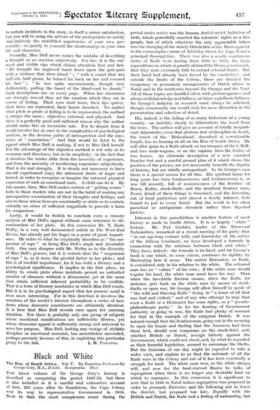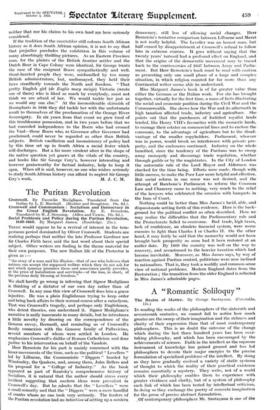Black and White
The Rise of South Africa. Vol. V. By Emeritus Professor Sir George Cory, M.A., D.Litt. (Longmans. 205.)
Tins latest volume of Sir George Cory's history is described as comprising the period 1847-53, but there is also included in it a careful and exhaustive account of how, 202 years after its foundation, the Cape Colony won its way to representative Government in 1854. Next to that the most conspicuous event during the period under notice was the famous Anti-Convict Agitation of 1849, which powerfully asserted the colonists' rights as a free people, but of which otherwise the only appreciable token was the changing of the stately Dutch title of the licerengracht to the commonplace name of Atliterley Street for Cape Town's principal thoroughfare. There was also a nearly continuous series of Kafir wars lasting from 1840 to 1853, the large expenditure on which so greatly alarmed the Home government, that they were extremely loth to extend colonial limits. But their hand had already been forced by the coortrekkerr, and outside the limits of the Colony, there are detailed the temporary or permanent arrangements of Dutch affairs in Natal and in the territories beyond the Orange and the Vaal. All of these topics are handled often with picturesqueness and always with knowledge and fullness, at times a plethoric fullness. Sir George's industry in research must always be admired, though occasionally one would wish for more discretion in the presentation and selection of detail.
His, indeed, is the failing of so many historians of a young country—an inability clearly to differentiate the wood from the trees. The author will give an account of totally insignifi- cant shipwrecks; even that glorious feat of discipline in death, the wreck of the Birkenhead,' described at considerable length, has no bearing at all on the Rise of South Africa. Ile will allot space to a Kafir attack on ten troopers of the C.M.R. and two mule-wagons, or on the capture from the Kafirs of two horses. An elaborate description of a now vanished frontier fort and a careful ground plan of it which shows the position of the privies, are not necessarily beneath the dignity of history, but are wholly unimportant. In Sir George's case there is a special reason for all this. His spiritual home for long years has been Grahamstown, and Grahamstown is, or was till recently, full of reminiscences of the frontier—of Boers, Kafirs, stock-thefts and the resultant frontier wars. Every detail of these things is treasured, and the historian, out of local patriotism and almost a family interest, feels bound to put in every detail. But the result is too often parochial or antiquarian chronicle rather than digested history.
Inherent in this parochialism is another feature of most history as made in South Africa. It is so largely " white " history. Mr. Piet Grobler, leader of the Transvaal Nationalists, remarked at a recent meeting of his party that "in our age-long contact with, and knowledge of, the native of the African Continent, we have developed a formula in connection with the relations between black and white." They have, indeed ; the formula is ice-hard, and Sir George's book is one which, to some extent, continues its rigidity by illustrating how it arose. The native IIottentot, or Kafir, is considered only in his relation to the white. The coloured man has no " values " of his own ; if the white man should require his land, the white man must have his way. Then when the inevitable friction ensues, when the Kafir, for instance, gets back on the white man by means of stock- thefts or open war, Sir George will allow himself to speak of "the wild and thieving Kafir" living in "a home of all that was bad and violent," and of any who attempt to urge that even a Kafir or a Hottentot has some rights, as a "pseudo- philanthropic party." As for the flouting of Government authority or going to war, the Kafir had plenty of warrant for that in the example of the emigrant Dutch. It was natural enough that the frontiersman, going out in the morning to open his kraals and finding that the Amaxosa had been there first, should vow vengeance on the stock-thief, and, whether British or Dutch, inveigh bitterly against the Government, which could not check, and, by what he regarded as their harmful legislation, seemed to encourage the -thefts. But the historian of our day might be expected to take a wider view, and explain to us that the rationale of all the Kafir wars in the Colony and out of it has been essentially a struggle for land. The white man won, as the white always will, and now for the land-starved Bantu he talks of segregation when there is no longer any desirable land on which to segregate. In this connexion it is significant to note that in 1848 in Natal native segregation was proposed in order to persuade Pretorlus and his following not to leave the district, but proposed too late. Equally with the British and Dutch, the Kafir had a feeling of nationality, but
neither that nor his claims to his own land are here seriously considered.
If the tradition of the voorlrekker still colours South African history as it does South African opinion, it is not to say that that prejudice precludes the exhibition in this volume of many absorbingly -thrilling pictures. As an Eastern- Province man, for the plaints of the British frontier settler and the Dutch Boer in Cape Colony were identical, Sir George treats the case of the emigrant Boers sympathetically and well. Stout-hearted people they were, mishandled by too many British administrators; but, undismayed, they held their faces steadfastly towards the North and freedom. "That pretty English girl (de Englis nwey meisje) Victoria (wrote one of them) who is liked so much by everybody, must not think we are afraid of her. We would tackle her just as we would any one else." At the inconsiderable skirmish of Boomplaats in 1848 they did tackle her with the unfortunate result to themselves of the proclamation of the Orange River Sovereignty. In six years from that event we grew tired of this troublesome possession, and in two years before that we had conceded independence to the Boers who had crossed the Vaal—those Boers who, as Governor after Governor 'had proclaimed, could never be regarded as other than British subjects. British vacillation and inconsistency of policy had by this time set up in South Africa a racial fester which still discharges. But a far more virulent ulcer in the shape of the native question yet gnaws at the vitals of the country, and books like Sir George Cory's, however interesting and however praiseworthy for factual industry, help to keep it open. When all is said, however, no one who wishes seriously to study South African history can afford to neglect Sir George





















































 Previous page
Previous page